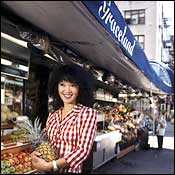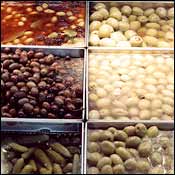
There are four key factors in running a successful deli in New York: name-brand recognition; 24-hour convenience; low rent; and an up-and-coming location where there’s little competition. Grace Dancyger is one of the few deli owners who seem to have mastered the formula. Her small-business empire has grown steadily for fifteen years, in an industry where countless delis open and close each year, shifting sites or owners or simply going bust. Dancyger owns three thriving delis in the East Village—Graceland, Gracefully, and Adinah’s Farms—whose combined annual revenue now tops $2.5 million. She opened each one just early enough to beat the neighborhood’s yuppie upswing and has marketed them as aggressively as a New York chef does his latest just-downscale-enough outpost. She’s the mogul of the Manhattan mini-mart.
There’s arguably no small business more familiar to New Yorkers than the corner deli, which makes owning one among the classic immigrant dreams. Then the owners tend to discover that the economic realities of the business are nightmarish. “By the time the month is over and the bills are paid, there’s not much left,” says Grace’s husband and business partner, Joel Dancyger. Except, of course, for the Dancygers. (The couple met in the late eighties, when Grace was running her first deli, near NYU, and Joel was a regular customer, a polite math professor who stopped in daily for cigarettes, miso soup, and papaya—and whom Grace nicknamed the Gentleman before she knew him as Joel.)
The smartly branded Gracefully is their most profitable and deli-redefining holding. It’s a radically different business model—more “look and linger” than “hit and run,” as Joel tells it—that grew out of Grace’s observing potential customers who were essentially importing their own groceries into the East Village. “I saw so many people getting out of taxis carrying nice-looking bags, and I started to talk to them,” she says. “They said, ‘We shop where we work, then bring it home to where we live, here.’ That was a trigger.”
The Dancygers wanted to capture the customers who were trekking across town to Dean & DeLuca in Soho to find fancy cheese and fresh bread. They opened Gracefully, a 5,000-square-foot market on Avenue A between 2nd and 3rd streets that does indeed behave more like a Dean & DeLuca than a neighborhood deli. For one thing, beer sells poorly. For another, its busiest time is the same as a supermarket’s, after 6 P.M., rather than a deli’s midday or late-night rush. “Within a dozen blocks, there is nothing like this,” says Joel. “If I can compare it to Citarella or Dean & DeLuca, their name recognition came because of the quality. In the produce section, you know whatever you reach for with your hand you won’t have to inspect. We want to offer the same kind of assurance. So it’s an oasis; it becomes known.”

To be known is an exception in a deli—Gracefully is one of the few that New Yorkers refer to by name. A name, a blue-and-yellow logo, really, that appears all over the store, inside and out: on the large street sign, on the mini-awning over the fresh bread and bagel bins to the right when you walk in, and on the polo shirts every worker must wear. “The customer recognizes who to turn to with a question,” says Joel. The deli exchange is no longer a wordless, anonymous interaction. The people, like the place, have identities. “For the worker, it’s clear that he’s starting his shift when he puts his shirt on.” And like the marketing minds behind fancier food shops—but with down-and-dirty hours—Grace is planning to convert the front of the store into a full-service, 24-hour café.
Yet for all her smarts and success, Grace Dancyger didn’t set out to run corner stores; she just wanted to learn English. She was 18 when she left Sokcho in Korea’s Kangwon province 25 years ago to come to New York. “I was working as a hostess at the United Nations for the Korean delegation, and I didn’t speak any English,” she says. “They just came to my high school looking for pretty, polite girls.” She lasted a year with the U.N., until her itch for more excitement and English led her to a series of jobs in Korean-owned delis across town. Until her language skills improved enough to man the cash registers, she was stuck in basements cutting and preparing fruit cups. (“Korean deli owners started the idea of packaging food in fruit cups,” Joel adds, explaining that it was a way to put damaged or bruised produce to use and so reduce waste.) Eventually, she ended up working for a Mr. Kim, a serial deli opener who had a simple business model: find a run-down store, refit it, then replace the staff with better-trained workers before selling or renting the place to the highest bidder.
Grace went through four different openings with Kim and watched his fortune grow. “That’s when I realized I could do this myself,” she says simply. “After all, he didn’t speak very good English either.” (According to the Dancygers, Kim returned to Korea in the late eighties after his New York businesses started failing.)
The couple’s first business together was Graceland, which they opened in 1991 on the corner of East 2nd Street. Rent each month was still rock-bottom, around $4,000 a month, and as business picked up, Grace and Joel finally started making money. They went on to open the hit-and-run-style Adinah’s Farms (named for their newborn daughter in 1994) on Avenue C, the least luxe of their delis, then Gracefully.
At the upscale bodega, Grace retained amenities like coffee by the cup and an ATM while keeping the prices of deli staples at all three stores the same: Gatorade’s $2.50 everywhere, for instance, and pints of Häagen-Dazs are $3.99. From gourmet groceries, she learned other lessons: the first, to premium-price produce. Bonita bananas are 69 cents a pound at Graceland but 79 cents a pound at Gracefully. The ATMs in all Dancyger delis deduct $1.95 per transaction, but Joel explains that the fees are used to offset the investment of buying the machine: The model at Graceland cost them $8,000 a decade ago, though the same one was only $4,000 by the time they came to buy it for Gracefully. Customers there with ready twenties in hand might be all the more tempted to buy from the enormous selection of exotic cheeses and a self-serve olive bar with a dozen varieties. “People here don’t cook too much and they don’t have a family,” Grace says. The gourmet-cheese spread was an instant hit. Reasons Joel, “Cheese works because you just need a knife to eat it.” But the true confirmation that the Dancygers have always been ahead of the curve in understanding their customer doesn’t come from cash or caffé lattes—it’s competition. A store on East 4th Street was recently refurbished to give it a clean, modern look. There’s a colorful, graphic sign and promotions that contain the word organic. Its new name?
Healthfully.
DELI SECRETS
Part I
Hitting the Expiration Date
An atypical deli owner faces the typical industry struggles—bellmarked Doritos, the DEA—and decides he wants out.Part II
Cornering the Corner Market
Grace Dancyger introduced branding to the Korean deli—and ended up with an East Village empire.Part III
Detour Delis
Ten worth going out of your way for.